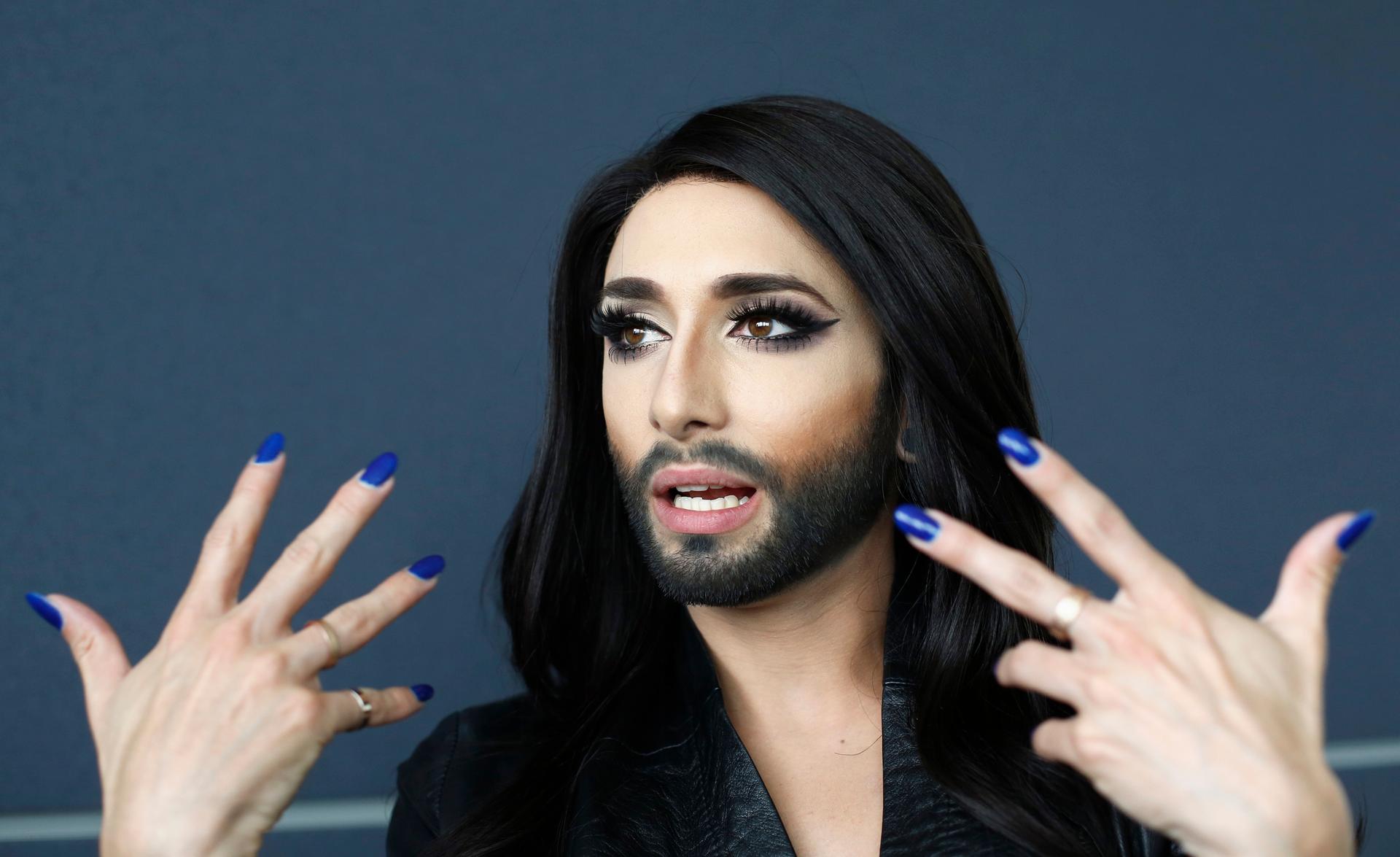This year’s Eurovision Song Contest has become a political and social minefield
Austrian drag queen Conchita Wurst in Vienna April 24, 2014. Wurst will take to the European stage as Austria’s contender for the Eurovision song contest.
The Eurovision Song Contest has a reputation for being a kind of kitschy, family entertainment.
It’s an annual competition that's been held among the member countries of the European Broadcasting Union since 1956. Each country submits a song to be performed on TV and radio and then casts votes for the other countries' songs to determine the winner.
This year, 37 countries are sending singers to perform next Saturday in Copenhagen, Denmark.
Eurovision has often given countries the opportunity to advance political disputes. In 2012, Armenia pulled out of the song contest hosted by Azerbaijan, over the conflict in the separatist region of Nagorno-Karabakh.
And the crisis in Ukraine has the potential to inject some serious tension into this year's event.
"Since both countries claim the territory of Crimea, the question of who Crimea's votes are going to count for is crucial, " says Karen Fricker, a professor at Brock University in Ontario and a member of the Eurovision Research Network. "If Ukraine is in charge of the telephone networks in Crimea, Ukraine will get the votes. If Russia claims those telephone lines, it will claim the votes."
Russia is sending blond twins, the Tolmachevy Sisters, and Ukraine will be represented by Maria Yaremchuk.
And there's another Eurovision controversy this year. It is over the Austrian performer, Conchita Wurst. Wurst wears high-heels, butterfly eyelashes — and a full beard. He is a drag queen.
“There were protests in Austria when the Austrian broadcaster announced that Conchita would be singing for the country," said Fricker. "And there have now been petitions in Russia, Belarus and Ukraine saying that they think that their nations simply shouldn’t compete, or should blank out that song because this contest is ‘a festival of sodomy, and is a bad thing for our children to watch’ because the contest is understood as [being] a family viewing adventure."
Wurst's entry has highlighted Europe's geographical divide on attitudes to homosexuality. The Eurovision Song Contest has a huge gay following. And Israeli transgender singer Dana International won the contest in 1998 with her song "Diva."
Every year an estimated 125 million viewers watch the contest. Previous winners include Celine Dion and Sweden's ABBA.
The Eurovision Song Contest has a reputation for being a kind of kitschy, family entertainment.
It’s an annual competition that's been held among the member countries of the European Broadcasting Union since 1956. Each country submits a song to be performed on TV and radio and then casts votes for the other countries' songs to determine the winner.
This year, 37 countries are sending singers to perform next Saturday in Copenhagen, Denmark.
Eurovision has often given countries the opportunity to advance political disputes. In 2012, Armenia pulled out of the song contest hosted by Azerbaijan, over the conflict in the separatist region of Nagorno-Karabakh.
And the crisis in Ukraine has the potential to inject some serious tension into this year's event.
"Since both countries claim the territory of Crimea, the question of who Crimea's votes are going to count for is crucial, " says Karen Fricker, a professor at Brock University in Ontario and a member of the Eurovision Research Network. "If Ukraine is in charge of the telephone networks in Crimea, Ukraine will get the votes. If Russia claims those telephone lines, it will claim the votes."
Russia is sending blond twins, the Tolmachevy Sisters, and Ukraine will be represented by Maria Yaremchuk.
And there's another Eurovision controversy this year. It is over the Austrian performer, Conchita Wurst. Wurst wears high-heels, butterfly eyelashes — and a full beard. He is a drag queen.
“There were protests in Austria when the Austrian broadcaster announced that Conchita would be singing for the country," said Fricker. "And there have now been petitions in Russia, Belarus and Ukraine saying that they think that their nations simply shouldn’t compete, or should blank out that song because this contest is ‘a festival of sodomy, and is a bad thing for our children to watch’ because the contest is understood as [being] a family viewing adventure."
Wurst's entry has highlighted Europe's geographical divide on attitudes to homosexuality. The Eurovision Song Contest has a huge gay following. And Israeli transgender singer Dana International won the contest in 1998 with her song "Diva."
Every year an estimated 125 million viewers watch the contest. Previous winners include Celine Dion and Sweden's ABBA.
Our coverage reaches millions each week, but only a small fraction of listeners contribute to sustain our program. We still need 224 more people to donate $100 or $10/monthly to unlock our $67,000 match. Will you help us get there today?
